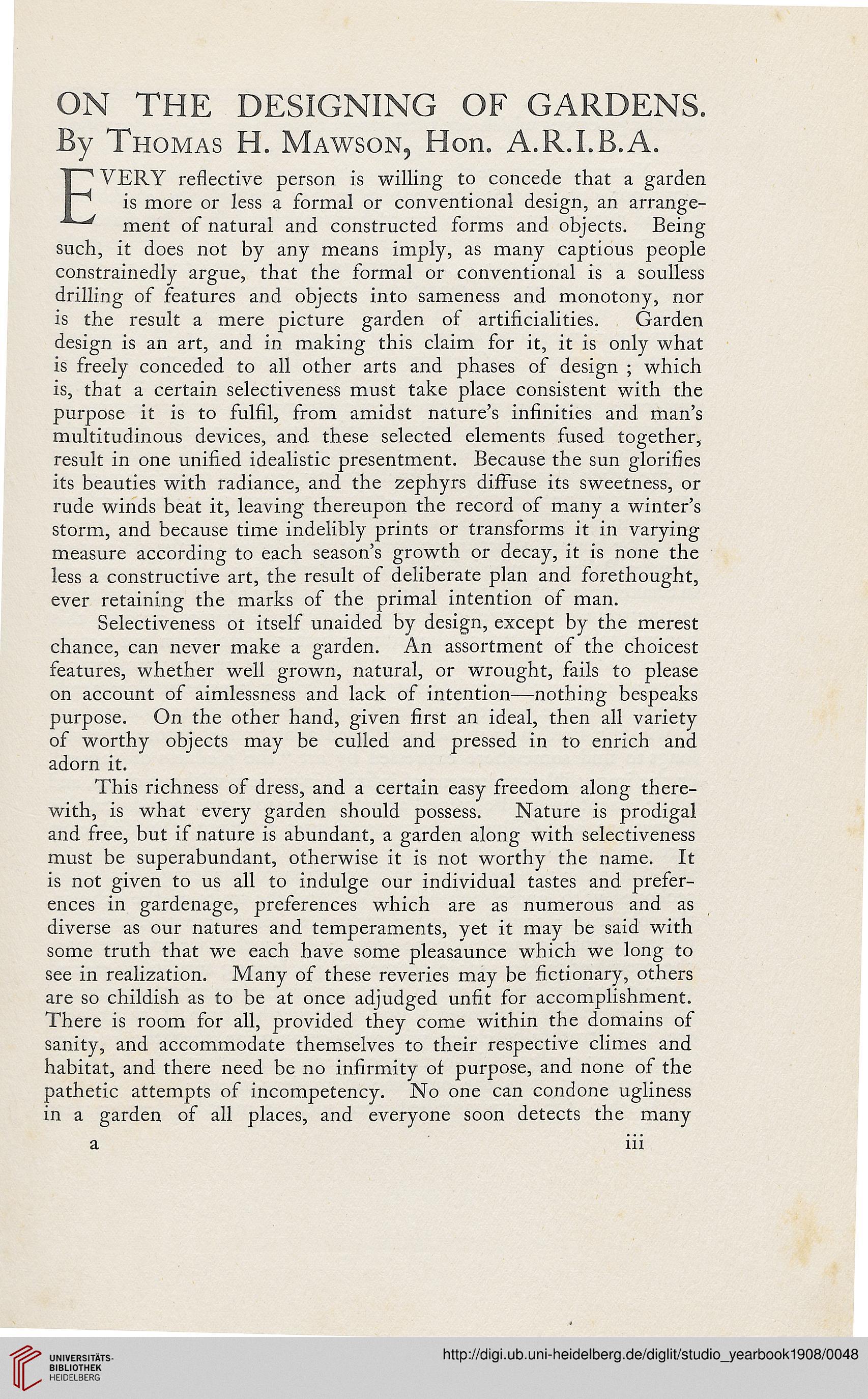ON THE DESIGNING OF GARDENS.
By Thomas H. Mawson, Hon. A.R.I.B.A.
EVERY reflective person is willing to concede that a garden
is more or less a formal or conventional design, an arrange-
ment of natural and constructed forms and objects. Being
such, it does not by any means imply, as many captious people
constrainedly argue, that the formal or conventional is a soulless
drilling of features and objects into sameness and monotony, nor
is the result a mere picture garden of artificialities. Garden
design is an art, and in making this claim for it, it is only what
is freely conceded to all other arts and phases of design ; which
is, that a certain selectiveness must take place consistent with the
purpose it is to fulfil, from amidst nature's infinities and man's
multitudinous devices, and these selected elements fused together,
result in one unified idealistic presentment. Because the sun glorifies
its beauties with radiance, and the zephyrs diffuse its sweetness, or
rude winds beat it, leaving thereupon the record of many a winter's
storm, and because time indelibly prints or transforms it in varying
measure according to each season's growth or decay, it is none the
less a constructive art, the result of deliberate plan and forethought,
ever retaining the marks of the primal intention of man.
Selectiveness ot itself unaided by design, except by the merest
chance, can never make a garden. An assortment of the choicest
features, whether well grown, natural, or wrought, fails to please
on account of aimlessness and lack of intention—nothing bespeaks
purpose. On the other hand, given first an ideal, then all variety
of worthy objects may be culled and pressed in to enrich and
adorn it.
This richness of dress, and a certain easy freedom along there-
with, is what every garden should possess. Nature is prodigal
and free, but if nature is abundant, a garden along with selectiveness
must be superabundant, otherwise it is not worthy the name. It
is not given to us all to indulge our individual tastes and prefer-
ences in gardenage, preferences which are as numerous and as
diverse as our natures and temperaments, vet it may be said with
some truth that we each have some pleasaunce which we long to
see in realization. Many of these reveries may be fictionary, others
are so childish as to be at once adjudged unfit for accomplishment.
There is room for all, provided they come within the domains of
sanity, and accommodate themselves to their respective climes and
habitat, and there need be no infirmity of purpose, and none of the
pathetic attempts of incompetency. No one can condone ugliness
in a garden of all places, and everyone soon detects the many
a iii
By Thomas H. Mawson, Hon. A.R.I.B.A.
EVERY reflective person is willing to concede that a garden
is more or less a formal or conventional design, an arrange-
ment of natural and constructed forms and objects. Being
such, it does not by any means imply, as many captious people
constrainedly argue, that the formal or conventional is a soulless
drilling of features and objects into sameness and monotony, nor
is the result a mere picture garden of artificialities. Garden
design is an art, and in making this claim for it, it is only what
is freely conceded to all other arts and phases of design ; which
is, that a certain selectiveness must take place consistent with the
purpose it is to fulfil, from amidst nature's infinities and man's
multitudinous devices, and these selected elements fused together,
result in one unified idealistic presentment. Because the sun glorifies
its beauties with radiance, and the zephyrs diffuse its sweetness, or
rude winds beat it, leaving thereupon the record of many a winter's
storm, and because time indelibly prints or transforms it in varying
measure according to each season's growth or decay, it is none the
less a constructive art, the result of deliberate plan and forethought,
ever retaining the marks of the primal intention of man.
Selectiveness ot itself unaided by design, except by the merest
chance, can never make a garden. An assortment of the choicest
features, whether well grown, natural, or wrought, fails to please
on account of aimlessness and lack of intention—nothing bespeaks
purpose. On the other hand, given first an ideal, then all variety
of worthy objects may be culled and pressed in to enrich and
adorn it.
This richness of dress, and a certain easy freedom along there-
with, is what every garden should possess. Nature is prodigal
and free, but if nature is abundant, a garden along with selectiveness
must be superabundant, otherwise it is not worthy the name. It
is not given to us all to indulge our individual tastes and prefer-
ences in gardenage, preferences which are as numerous and as
diverse as our natures and temperaments, vet it may be said with
some truth that we each have some pleasaunce which we long to
see in realization. Many of these reveries may be fictionary, others
are so childish as to be at once adjudged unfit for accomplishment.
There is room for all, provided they come within the domains of
sanity, and accommodate themselves to their respective climes and
habitat, and there need be no infirmity of purpose, and none of the
pathetic attempts of incompetency. No one can condone ugliness
in a garden of all places, and everyone soon detects the many
a iii




